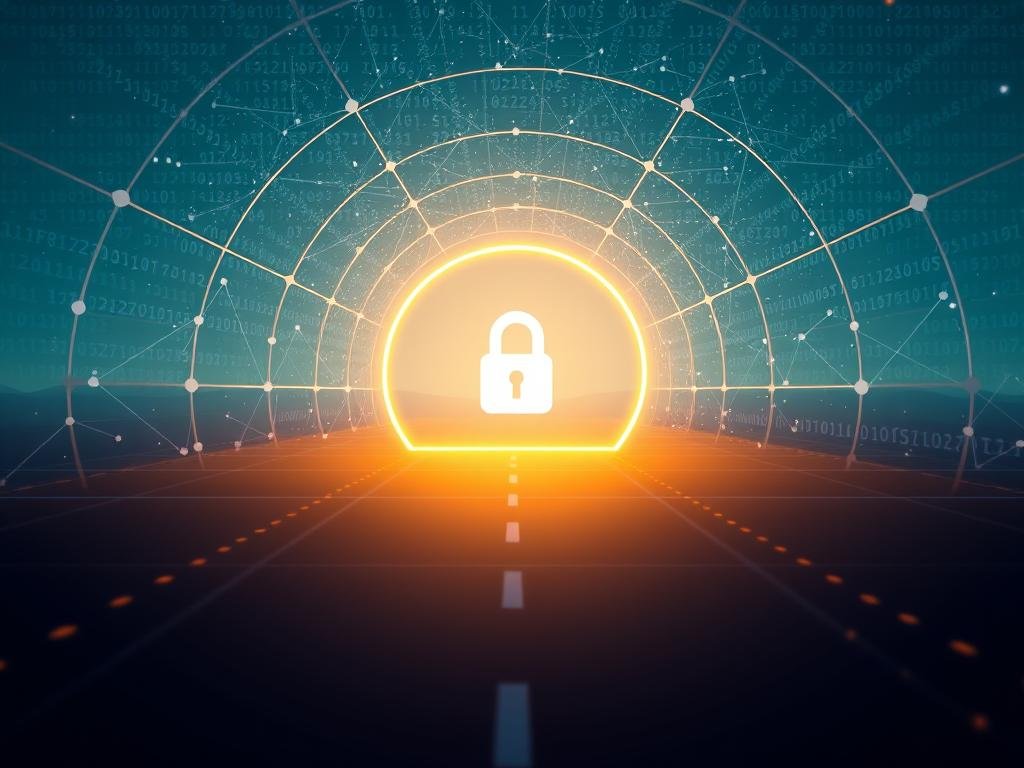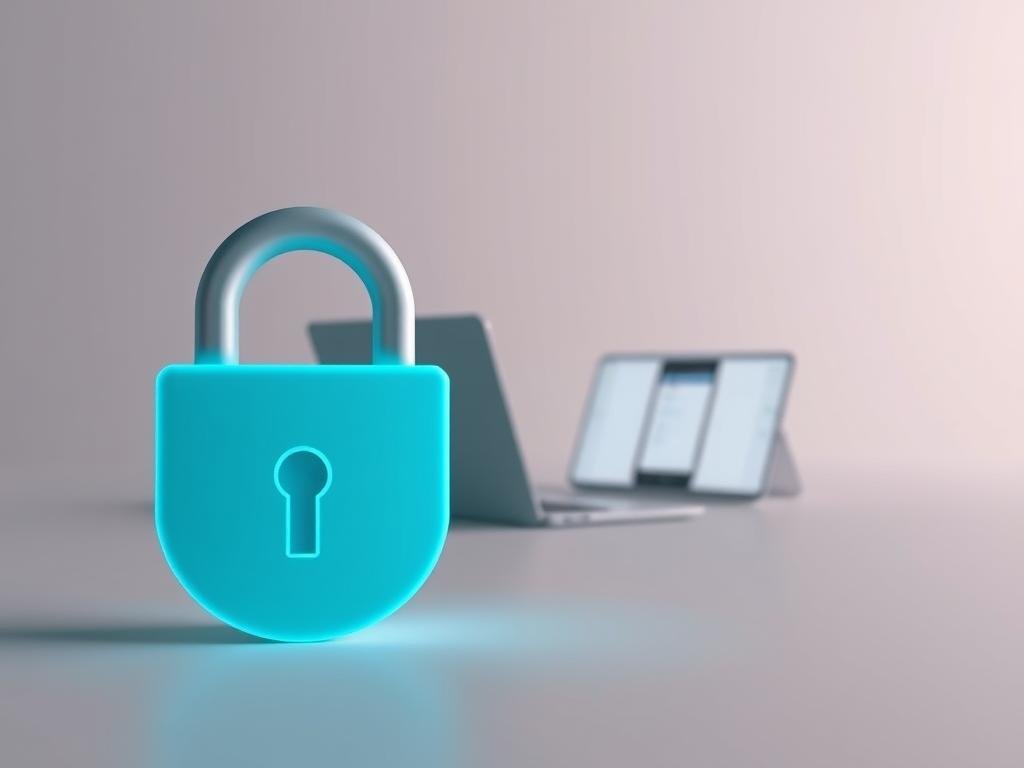All about VPNs: Why use them and the best options

All about VPNsWhy Use and Best OptionsSecurity and privacy on the Internet are growing concerns in an increasingly connected world.
With the growing threat of hackers and online surveillance, many people are turning to the VPNs to protect your data personal.
But what are VPNs and how do they work? In short, a VPN creates a secure tunnel between your device and the internet, encrypting your data and protecting your online identity.
By using a VPN, you can surf the internet with more security e privacyYou can also access blocked content and keep your personal data safe. In this article, we'll explore the best VPN options available to Brazilian users.
What a VPN is and how it works
With the growing need for online security, understanding what a VPN is has become essential. A VPN, or Virtual Private Network, is a technology which allows you to create a secure and encrypted connection between your device and a server remote.
Definition and basic concept
A VPN hides your address IP, allowing your connection to be redirected through a server specially configured.
This means that when you surf online with a VPN, the VPN server becomes the source of your data. data. As a result, your Internet Service Provider (ISP) and third parties cannot see which websites you visit or which data you send and receive online.
How VPN technology works
VPN technology works in a simple but effective way. When you activate a VPN, your connection with the internet first passes through a remote server before reaching its final destination.
This process replaces your address IP by the VPN server address, making it impossible to track your real location or identify who is behind the navigation.
In addition, the VPN uses advanced cryptography which transform your data into complex codes, ensuring that even if someone intercepts your connection, they won't be able to decipher the information.
To find out more about how a VPN can improve your navigation secure and private, visit our article on VPN for safe surfing and private in the.
This will allow you, as userIf you want to surf in complete privacy, your internet service provider will only see an encrypted connection to the VPN server and will not be able to monitor your online activities.
The history and evolution of VPNs
The history of VPNs is fascinating and reflects the evolution of technology to protect online privacy. VPNs trace their roots back to the early 2000s, when they began to be adopted by companies to protect confidential data.
Origins of VPN technology
The first commercial VPNs appeared in the early 2000s and were initially adopted by companies that they needed to protect data confidential. This technology was developed to provide a secure and private connection between different locations within a company.
Development and popularization
The VPN consumer market began to grow significantly after a series of widely publicized security breaches in the early 2010s. According to GlobalWebIndex, the number of users of VPNs worldwide increased more than fourfold between 2016 and 2018.
- In countries with strong internet censorship and restrictions, such as China, Thailand and Indonesia, by 20% of the users use services VPN on a regular basis.
- Although in Western countries such as the US, UK and Brazil adoption is still lower (around 5%), the upward trend is steady as more people seek to protect their privacy online.
O use of VPNs continues to grow as more people become aware of the importance of digital privacy.
All about VPNs: Why use them and the best options
If you're wondering why you should use a VPN, here are the answers. With the growing need for online security, understanding the role of VPNs is crucial.
Main reasons for using a VPN
The main reason for using a VPN is to improve security your connection to the Internet. This is especially important if you regularly connect to networks Wi-Fi public.
By using a VPN, you encrypt your data, making it difficult for hackers to intercept your information. This includes passwords, personal data and payment information.
Ideal situations for VPN use
There are various situations in which use of VPN is highly recommended:
- When connecting to public Wi-Fi networks in coffee shops, airports, hotels and other places where the security of the connection is questionable.
- During international trips, to access services and content in your country that may be geographically blocked.
- For those who work remotely, ensuring secure connection with the corporate network.
- When carrying out financial transactions online, adding an extra layer of security.
- For users who value their privacy and want to avoid having their online activities monitored.
| Situation | Benefits of using a VPN |
|---|---|
| Connecting to public Wi-Fi networks | Security against data interception |
| International travel | Access to geographically blocked content |
| Remote working | Secure connection to the corporate network |
In short, using a VPN is an effective measure to protect your business. connection and guarantee access secure online content.
Benefits of a VPN connection
With a VPN, you can surf the internet safely and privately. This is especially important in a world where online security is constantly under threat.
Data protection and privacy
The protection of data is one of the main benefits of using a VPN. By encrypting your connectionA VPN prevents third parties from intercepting your information personal.
Access to geo-restricted content
In addition to security, a VPN also allows you to access content that may be blocked in your region. This is possible because the VPN masks your IP address, making it look like you're accessing the internet from somewhere else.

Security in public networks
This is especially important if you regularly connect to networks Public Wi-Fi. When using a VPN in networks you create an additional layer of security which prevents other users on the same network from intercepting your connection.
| Benefits | Description |
|---|---|
| Data Protection | Encrypts your information to prevent interception. |
| Access to Restricted Content | Allows you to access content blocked in your region. |
| Public Network Security | Protects your connection on public Wi-Fi networks. |
Types of VPN available on the market
There are several types of VPN available on the market, each with its own specific characteristics and uses. Choosing the right type of VPN depends on your needs for security, privacy and access to remote resources.
SSL VPN
SSL VPN (Secure Sockets Layer) is a type of VPN that uses the SSL/TLS protocol to create a secure connection between the client and the server. It is commonly used to provide secure remote access to network resources.
Site-to-site VPN
A site-to-site VPN connects two different networks via a secure connection. This is particularly useful for companies with several branches, allowing them to share network resources securely.
Client to Provider VPN
A Client-to-Provider VPN is the most common type for individual use. You install a software client on your device, which connects directly to the VPN provider's servers.
This establishes a direct and secure connection between your device and the VPN server, encrypting all the data before leaving the device.
- Establishes a secure and direct connection to the VPN server.
- Encrypts all data before it leaves the device.
- Useful for bypassing access restrictions to internet imposed by governments or service providers.
- Easy to use, with simple installation and activation.
When choosing a VPN, it is crucial to consider your specific needs and the type of VPN that best meets those needs. A connection and the protection of data are fundamental for a safe user experience in internet.
| Type of VPN | Description | Recommended use |
|---|---|---|
| SSL VPN | It uses the SSL/TLS protocol for secure connections. | Secure remote access to network resources. |
| Site-to-site VPN | Connects two different networks securely. | Companies with several branches. |
| Client to Provider VPN | Direct and secure connection between the device and the VPN server. | Individual use, online security and privacy. |
How to choose a reliable VPN service
Choosing a reliable VPN service is crucial to ensuring your online security. With the growing need to protect personal data and guarantee privacy on the internet, choosing the right VPN service is essential.
Important selection criteria
When selecting a VPN service, it's important to consider a few key criteria. Firstly, check the company's privacy policy and whether it is transparent about the data it collects and how it uses it. In addition, it is crucial to check that the VPN service has a good reputation among users and that it offers adequate support.
- Check the service's privacy and transparency policy.
- Evaluate the service's reputation among users.
- Consider the quality of the support offered.
Pitfalls to avoid
When choosing a VPN service, there are some pitfalls you should avoid. Some free VPN services can monitor your activities and sell your data to third parties.
In addition, services that are not transparent about their data storage policies or are based in countries with strict surveillance laws should be avoided.
- Be wary of free VPN services that can monitor your activities.
- Avoid providers who are not transparent about their data policies.
- Watch out for services that promise "anonymous VPN 100%" or "total privacy".
By being aware of these criteria and pitfalls, you can choose a VPN service that meets your needs and protects your data effectively.
Installing and configuring VPN on different devices
Setting up a VPN on different devices is essential to ensure online security. With the variety of devices we use on a daily basis, it's crucial to understand how to install and configure a VPN on each of them.
VPN on Windows and Mac computers
Installing a VPN on Windows and Mac computers is relatively simple. For Windows, you can use the application provided by your VPN provider or set it up manually using the network settings.
On the Mac, you can use the VPN application or set it up via the network preferences.
VPN on Android and iOS smartphones
On smartphones, VPN configuration is done by downloading the VPN application from the app store, either Google Play Store to Android or App Store for iOS.
After installation, you follow the instructions within the application to connect to the VPN.
VPN on home routers
Set up a VPN directly in router is an efficient solution for protecting all the devices connected to your network at the same time.
This is ideal for households with multiple devices. Configuration may require a little more technical knowledge, but many VPN providers offer detailed guides.
| Device | Easy configuration | Security |
|---|---|---|
| Computer Windows/Mac | Easy | High |
| Android/iOS smartphone | Easy | High |
| Home Router | Moderate | Very high |
Best VPN services for Brazilian users
In this article, we'll explore the best VPN services for users in Brazil, highlighting their features, prices and performance.
NordVPN: features, prices and performance
NordVPN is one of the most popular and reliable VPNs available on the market. With a network of more than 5,000 servers in 60 countries, it offers excellent coverage for users all over the world.
Resources: NordVPN offers advanced security features, including military-grade encryption and malware protection.
Prices: Subscription plans vary according to the length of the commitment, with significant discounts for annual plans.
Surfshark: features, prices and performance
Surfshark is another highly recommended VPN, known for its no-logging policy and robust security features.
Resources: In addition to its no registration policy, Surfshark offers CleanWeb, an ad and malware blocker.
Prices: Surfshark is competitive in terms of price, offering affordable plans without compromising on quality.
AtlasVPN: features, prices and performance
AtlasVPN is a relatively new service, launched in 2020, but it has been gaining popularity with its generous offer of security features and functionalities.
Resources: Among the main features is SafeBrowse, which adds layers of protection to browsing by blocking malicious sites and phishing attempts automatically.
Prices: AtlasVPN offers competitive plans and a free option to test the service.
Risks and limitations of using VPNs
Although VPNs offer many benefits, it is crucial to understand the risks and limitations associated with their use. By using a VPN, you are adding an extra layer of security to your network. connection with the internet, but this can also affect the speed of your navigation.
Possible security problems
When using a VPN, you should be aware that some VPN services may not be completely secure.
It is essential to choose a reliable VPN provider to avoid security problems. In addition, some platforms can detect and block connections known VPNs, which can limit access to certain content.
"Online security is a game of cat and mouse; it's important to always be one step ahead."
Technical and speed limitations
O use VPN inevitably reduces the speed your connection with the internet, as your data needs to be encrypted and routed through additional servers.
The fall of speed may vary depending on the distance between you and your chosen VPN server. Free or low-cost services often impose data or distance limits. speedmaking them unsuitable for bandwidth-intensive activities.
| Type of VPN | Speed | Security |
|---|---|---|
| Free of charge | Limited | Low |
| Paid | High | High |
For more information on VPNs and how to use them, you can visit this article which offers additional details on the subject.

Legal aspects of VPN use in Brazil
The use of VPNs in Brazil is legal, but it is important to know the legal implications. Brazilian legislation allows users to use VPNs to protect their online privacy.
A General Data Protection Law (LGPD) reinforces the right to digital privacy, making the use of VPNs a shape legitimate way of protecting personal information. However, it is crucial to understand that using VPNs does not make illegal activities such as hacking or unauthorized access to systems legal.
For user Brazilian, it is essential to choose a VPN that offers end-to-end encryption and does not keep records of your online activity. This guarantees security and privacy in country.
| VPN | Cryptography | Activity Registration |
|---|---|---|
| NordVPN | Yes | No |
| Surfshark | Yes | No |
| AtlasVPN | Yes | No |
By choosing a VPN, you are making a use aware of VPNS to protect your privacy.
Conclusion
With the growing dependence on the internet, VPNs have become a essential tool for anyone concerned about security e privacy digital.
When choosing between the various options available, it is essential to assess your specific needs and prioritize services with clear no-data-storage policies.
Although no solution offers absolute protection, a quality VPN represents a significant layer of protection. security against the most common threats.
Investing in a premium service usually pays off in terms of speed and reliability, improving your online experience by shape safe.
FAQ
Q: What is a VPN and how does it protect my data?
A: A VPN, or Virtual Private Network, is a technology that creates a secure, encrypted connection between your device and a server. This protects your data from interception and unauthorized access, guaranteeing your online privacy.
Q: Can I use VPN on different devices?
A: Yes, you can use VPN on various devices, including Windows and Mac computers, Android and iOS smartphones, and even on routers domestic. Many VPN services offer applications and configurations for different platforms.
Q: Why do I need a VPN to access geo-restricted content?
A: A VPN allows you to access geo-restricted content by changing your IP address to one from another country, making it look like you're accessing it from there. This is useful for accessing streaming services and other content that isn't available in your region.
Q: Can a VPN affect the speed of my internet connection?
A: Yes, a VPN can affect the speed of your internet connection, as the encryption and redirection of traffic can cause a small loss of speed. However, many VPN services optimize their connections to minimize this impact.
Q: Is it legal to use a VPN in Brazil?
A: Yes, it is legal to use a VPN in Brazil. However, it is important to use VPNs for legitimate purposes and not for illegal activities. In addition, it is essential to choose a reliable VPN service that respects your privacy.
Q: How do I choose a reliable VPN service?
A: To choose a reliable VPN service, you should consider criteria such as the privacy policy, the security offered, the speed and stability of the connection, as well as additional features such as servers in different countries and support for different devices.







